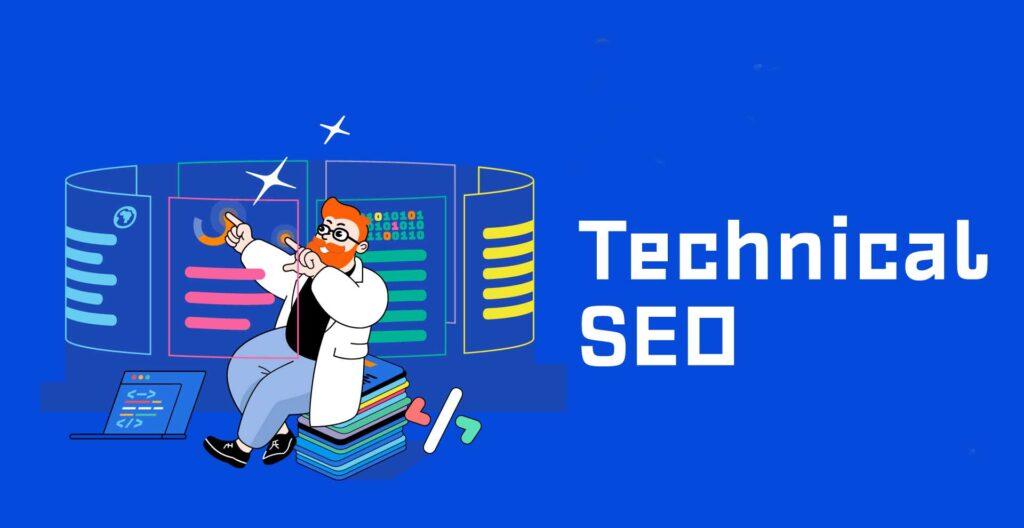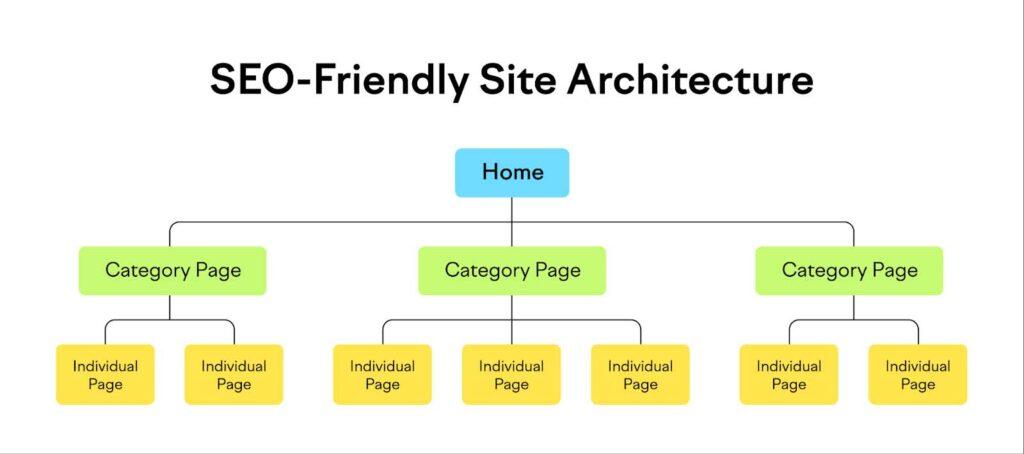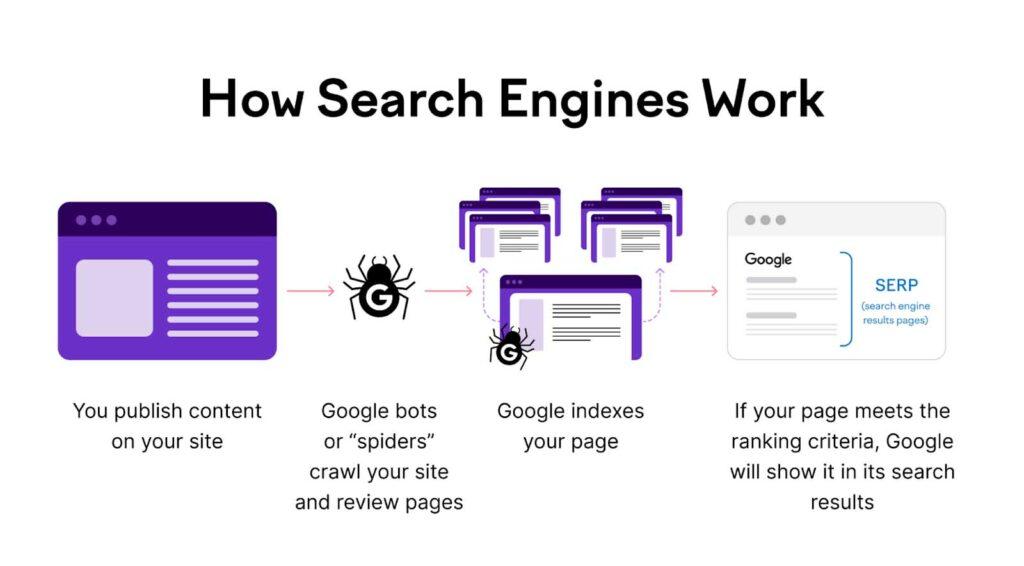
Technical SEO is a set of best practices and strategies that focus on optimizing your website for search engine crawlers. This includes improving the structure, content, and speed of your website to rank higher in organic search results. Technical SEO helps ensure your website appears visible to potential customers who are searching for specific keywords related to your business.
When done correctly, Technical SEO can dramatically increase organic website traffic, allowing you to get more leads and conversions. A successful technical SEO strategy requires a deep understanding of how search engine algorithms work and the best practices that should be followed when optimizing your website.
How do users interact with websites?
To understand how to optimize your website for search engine crawlers, you must first understand how users interact with websites. Users typically arrive at a website by typing in specific keywords or phrases into search engines like Google or Bing.
Once they have landed on the website, they will usually browse through different pages and read the content before clicking on any links. The longer they spend on your website, the more likely it is that they will engage with your content and convert into a customer.
It’s important to optimize your website for search engine crawlers so that you are delivering relevant content to potential customers when they land on your website. This means creating keyword-rich pages and making sure all links on the page are working properly. learn more about keyword research at https://seotraffichero.com/seo/seo-keyword-research/
What are the benefits of Technical SEO?
The main benefit of Technical SEO is increased organic website traffic as well as higher rankings in search engine results pages (SERPs). When done correctly, technical SEO can offer many advantages including:
- Increased visibility in SERPs: Technical SEO helps make sure your website appears on the first page of search engine results pages or SERPs.
- Improved user experience: Technical SEO involves improving the structure, content and speed of your website to make it easier for users to navigate and find what they’re looking for quickly.
- Increased organic traffic: Optimizing your website with technical SEO helps ensure potential customers can find your website more easily. The higher your website appears in SERPs, the more likely visitors are to click through and engage with your content.
Overall, technical SEO is an essential part of any successful SEO strategy as it helps ensure that potential customers can find your business online. With the right strategies and techniques, you can increase organic traffic, improve user experience, and rank higher in search engine results pages.
Create SEO-Friendly Site Architecture
When it comes to optimizing your website for search engine crawlers, one of the most important elements is creating an SEO-friendly site architecture. This involves organizing the content on your website in a way that is easy to navigate and makes sense to both humans and search engine crawlers.
It’s important to create a simple, logical structure with relevant headings and subheadings to help visitors quickly find what they are looking for. Additionally, you should make sure all of the links on your page are working properly as broken links can negatively impact SEO performance.

Finally, it’s important to remember that search engine crawlers cannot read images or videos so make sure you include descriptive text alongside any visual content. This will help ensure search engines can understand the content on your website and rank it accordingly in SERPs.
Submitting Your Sitemap to Google
Once you’ve optimized the structure and content of your website, the next step is submitting a sitemap to Google. A sitemap is an XML file that contains all of the URLs on your website as well as other important information like when the page was last updated.
Submitting a sitemap to Google helps ensure that search engine crawlers can find and index all of the pages on your website. Additionally, it gives you a better understanding of how Google views your website which can be helpful when analyzing SEO performance.
Understanding Indexing & Crawling

Any successful SEO strategy requires a deep understanding of indexing and crawling. Indexing is the process of adding webpages to a search engine’s database, while crawling is the process of searching for new content on the internet.
Search engine crawlers are constantly looking for new content on the internet to update their databases. If your website is optimized with technical SEO, it is more likely to appear in SERPs and be indexed by search engine crawlers.
Canonicalization & Redirects
Canonicalization and redirects are an important part of technical SEO. Canonicalization is the process of creating a single ‘canonical’ version of a webpage so that search engines know which page to index. This helps ensure your website appears in SERPs with the correct URL and content.
Redirects are also an essential part of technical SEO as they help tell search engine crawlers where to go if a page has been moved or deleted. Properly implemented redirects can prevent broken links and ensure that your website is easy to navigate for both users and search engine crawlers.
Technical SEO Best Practices
The most successful Technical SEO strategies involve following best practices. These include:
Use HTTPS
HTTPS is an important part of SEO as it helps ensure that data sent between a website and its users is secure. Additionally, Google has stated that they give preference to websites that use HTTPS when indexing webpages.
Make Sure Only One Version of Your Website Is Accessible to Users and Crawlers
Duplicate content can hurt SEO performance. It’s important to make sure only one version of your website is accessible to users and search engine crawlers so that all content is properly indexed and ranked in SERPs.
Monitor Crawl Errors & Broken Links
Broken links can hurt SEO performance. It’s important to monitor crawl errors and broken links regularly to make sure all links are working properly so that users and search engine crawlers can navigate your website easily.
Improve Your Page Speed
Page speed is an important factor when it comes to SEO as it affects the user experience. It’s important to make sure your website is loading quickly and efficiently so that users can access your content quickly and easily.
Ensure Your Website Is Mobile-Friendly
Google has stated that mobile-friendliness is a ranking factor in its search results. It’s important to make sure your website is optimized for mobile users so they can access your content easily regardless of the device they are using.
Implement Structured Data
Structured data is a type of code that helps search engines better understand the content on your website. It’s important to use structured data to make sure search engine crawlers can index and understand your content so it can be properly ranked in SERPs.
Find & Fix Duplicate Content Issues
Duplicate content can hurt SEO performance. It’s important to find and fix any duplicate content issues so that your website is properly indexed by search engine crawlers.
Monitor & Analyze Your Competitors’ Websites
It’s important to monitor and analyze the websites of your competitors, as this will help you understand their SEO strategies and figure out how to optimize your website accordingly.
Optimize for Core Web Vitals
Core Web Vitals are a set of metrics that measure the user experience on your website. It’s important to optimize for these metrics as Google has stated that they will be part of its ranking algorithm in 2023.
Use Hreflang for Content in Multiple Languages
If you have content in multiple languages, it’s important to use Hreflang tags so search engine crawlers can accurately index and rank your content in SERPs.
Optimize for Featured Snippets
Featured snippets are highly visible pieces of content at the top of SERPs. It’s important to optimize for featured snippets as they can increase organic traffic to your website.
By following these technical SEO best practices, you can ensure that your website is optimized for search engine crawlers and improve the user experience for visitors.
Conclusion
Technical SEO is a crucial part of any successful SEO strategy as it helps ensure that search engine crawlers can accurately index and rank your content in SERPs. By following the best practices outlined in this guide, you can ensure that your website is optimized for search engine crawlers and maximize SEO performance.
To maximize the success of your website, it’s important to regularly monitor and analyze the performance of your SEO strategy. Analyzing your website’s performance will give you a better understanding of how search engine crawlers view your content so you can adjust your strategies accordingly.
